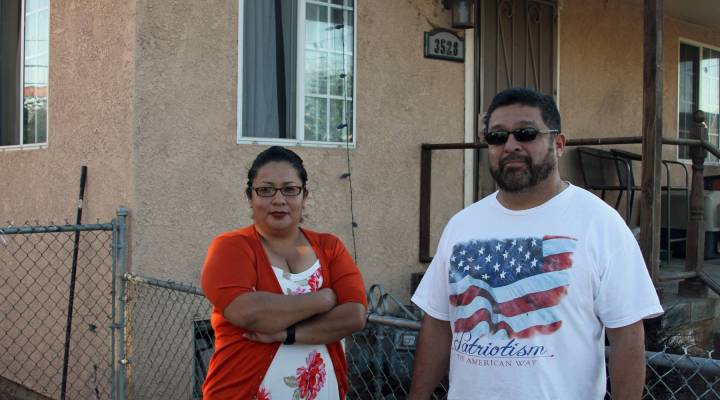
Lead contamination poisons a neighborhood’s home values

Scott Seltzer recently celebrated his first anniversary of owning a home in the Boyle Heights neighborhood of Los Angeles. Though he loves his home, he wishes he hadn’t bought it. Seltzer was unaware at the time that his block falls within an area believed to be highly contaminated with lead.
“I’m lucky, I don’t have kids, because just talking to people, it seems like the main effect is that it affects developing brains,” Seltzer said. “My girlfriend and I would have to get tested if we were to have kids at this point, and 90 percent I wouldn’t have, even though this is an affordable area, and I love my house and love everything about it.”
Seltzer is awaiting tests of his yard to see whether it requires cleanup. In the meantime, he said family-planning decisions will have to wait.
“It’s a major factor, and we’ll see what happens after they test us, but we’ll make our decision after that,” Seltzer said.
Several neighborhoods in East Los Angeles are living with the legacy of a battery recycling plant whose decades-long operation left widespread lead contamination in as many as 10,000 yards.
For homeowners whose property falls within a contaminated environment, typical worries include health impacts and quality of life, but troubles extend to home values as well.
Some residents like Seltzer, however, may soon receive slight relief in the form of lower property taxes. The Los Angeles County assessor’s office is reassessing homes within a 1.7 mile radius of the former Exide Technologies recycling plant.
“We’re studying all the properties impacted by Exide to see if they’ve been impacted by the environmental damage and if their value has been affected,” the Los Angeles County assessor, Jeff Prang, said. “If it has been, we will lower that value for tax purposes, which would result in a property tax benefit to the people who live in the affected area.”
Prang said property reassessments typically occur in two situations: the first is misfortune and calamity, such as fire, floods or other obvious damage; the second is a decline in value like the one seen after the housing market crash in the late 2000s. The Exide contamination is new territory for his office.
“To the best of my knowledge, we’ve not dealt with an environmental impact, so we’re still trying to figure out just how everything fits into our program,” Prang said.
Prang said he anticipates the reassessments of about 10,000 homes will be completed in July. Even after the assessments are complete, not all homeowners will benefit. Potential tax reductions will depend on the point at which the house was purchased.
“The homes that will be the most impacted are the ones that changed ownership most recently — probably from 2006 till today,” Prang said. “Those are the properties that will be the most heavily impacted.”
Seltzer could get a property tax break if his home’s value has dropped. Terry Cano, who lives just down the block, is not likely to be as lucky. Cano’s house has been in her family for generations. She already has a low property assessment, so she probably won’t get a tax break. On top of that, she fears no one would want her property.
“I can’t sell, and so if I can’t sell, I can’t relocate,” she said. “And I can’t afford to pay this mortgage and another mortgage or a rent elsewhere, so we’re kind of stuck here.”
Cano, who keeps an immaculate home for fear of lead getting inside, said her property was tested and found to have contamination at levels of about 1,500 parts per million, well above the state’s highest categorical threshold. She is awaiting cleanup of her yard.
For Cano, however, property value is a lesser concern than her own well-being. She has a host of health problems she attributes to the lead: autoimmune disease, severe asthma, strokes and osteoporosis.
“There’s so many things that are wrong with me, and I’m only 43,” she said.
There’s a lot happening in the world. Through it all, Marketplace is here for you.
You rely on Marketplace to break down the world’s events and tell you how it affects you in a fact-based, approachable way. We rely on your financial support to keep making that possible.
Your donation today powers the independent journalism that you rely on. For just $5/month, you can help sustain Marketplace so we can keep reporting on the things that matter to you.


















